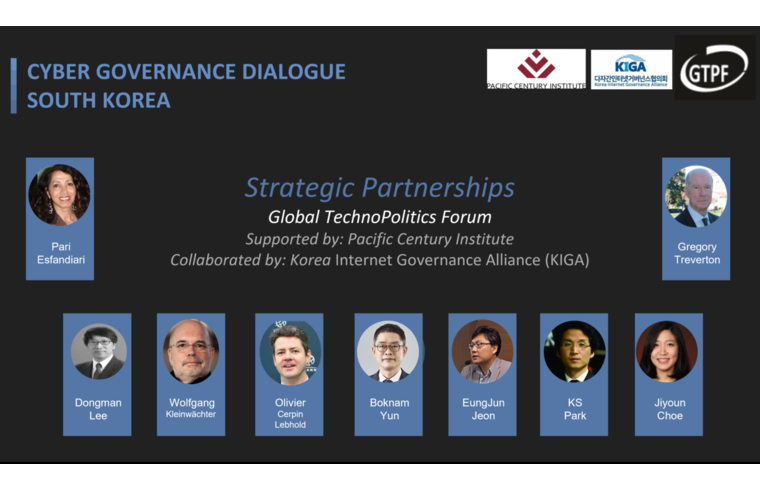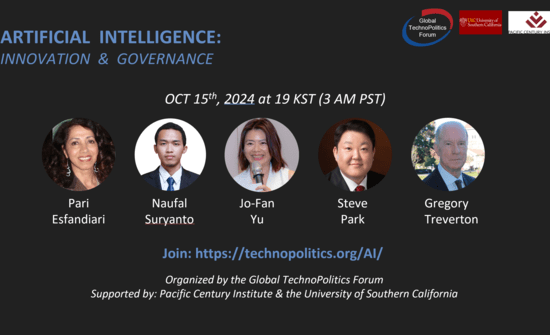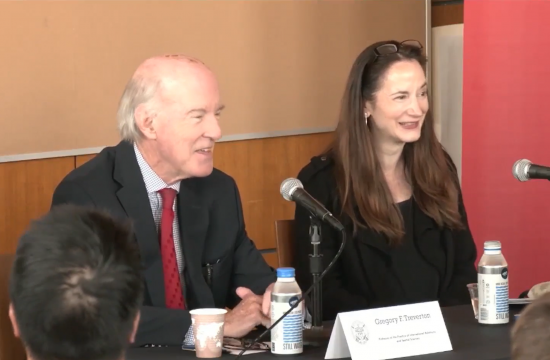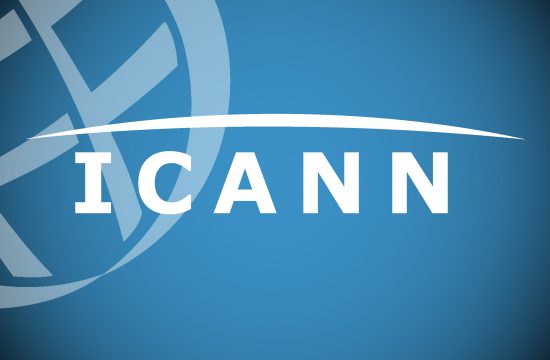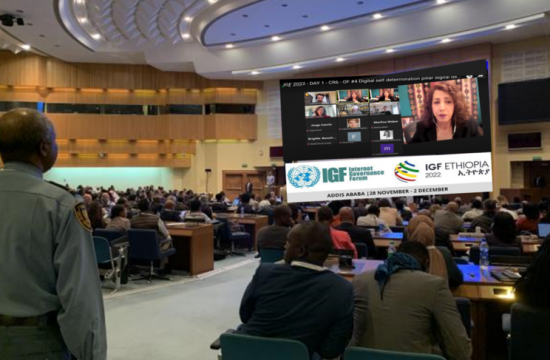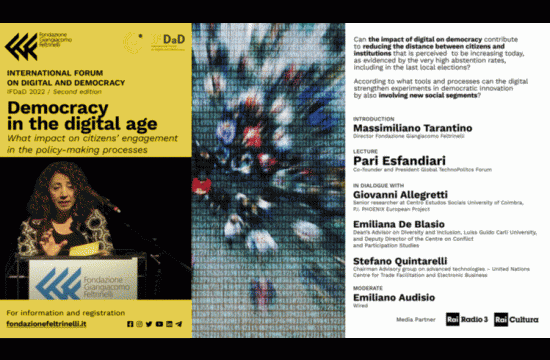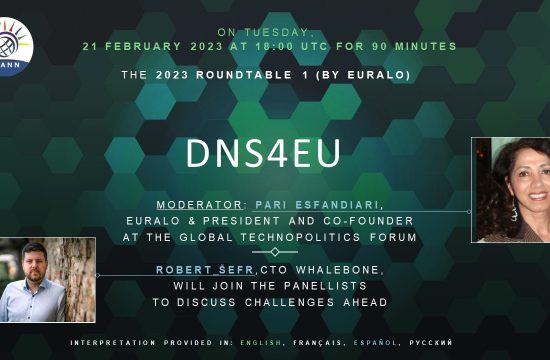In collaboration with the Korea Internet Governance Alliance (KIGA)
Supported by: Pacific Century Institute,
March 2022
Read the full report:
https://technopolitics.org/wp-content/uploads/2022/04/S.Korea_.Report-CyberGovernanceDialogue.pdfWatch the discussions:
- Part I: Historical background – the evolution of global Internet governance and its institutions. https://youtu.be/Sq4w0FtRoxw
- Part II: The development of the Internet and its governance in South Korea. https://youtu.be/NCoEzDxpbAQ
- Part III: Discussed the instruments of governance and geopolitics. These included privacy, content, trade, and security. https://youtu.be/rYxmEuJcNK4
AGENDA
Part I
–Opening Remarks (Gregory Treverton, Pari Esfandiari, Dongman Lee) (5 min)
History of the Internet Governance (71 minutes)
Provides a brief history of how the Internet and its governance evolved. This includes a discussion of the key principle of a decentralized network of networks to prevent the possible threat to the communications system from the Soviet Union. Discussion of the six waves of the internet, the US government’s abdication, penetration of the internet into every aspect of life, and potential for the cyber cold war? Definition of Internet governance, and the working of the complex system that underpins the internet’s technical infrastructure, applications, services, and content. Discussion of the institutions, actors, mechanisms, and rules that govern the internet, covering three broad areas: tools (laws, policies, technical standards or codes of conduct that are formed, monitored, and enforced by numerous actors.); the layers (Infrastructure, Logical/technical, application, and content) upon which these tools are used at the local, national, regional and global levels; and the actors that are involved in shaping these rules.
- Introduction by Gregory Treverton (1 Minute)
- Wolfgang Kleinwächter (20 minutes) – Pre Recorded Presentation
- Olivier Crepin-Leblond (20 Minutes) – Pre Recorded Presentation
- Roundtable Discussion- Moderated by Pari Esfandiari (20 minutes)
Part II
Views from South Korea
- Ten minutes Break (10 minutes)
Part III
-
Instruments of Governance and Geopolitics: (86 minutes)
This section begins with an understanding of key treaties, legislations, and agreements in relation to: privacy, content, trade, and security and deep dives into the Geopolitical context and current alliances and influences, ideological differences, and cultural and value divergences as well as the notion of data sovereignty. It then turns to discuss the two challenges of: the multistakeholder model and Internet fragmentations before turning to a discussion of the potential future outcomes.
- Introduction by Gregory Treverton (1 minute)
- Presentation – Greg Treverton & Pari Esfandiari (30 minutes)
- Presentation – EungJun Jeon (15)
- Roundtable Discussion – Moderated by KS Park, and discussant Jiyoun Choe (15 minutes).
- Closing Remarks – Gregory Treverton (1 minute)
Speakers Profile
From the United States:
Gregory Treverton is Chairman and co-founder at the Global TechnoPolitics Forum. He stepped down as chairman of the National Intelligence Council in January 2017. He is a senior adviser with the Transnational Threats Project at the Center for Strategic and International Studies (CSIS) and a professor of the practice of international relations and Spatial Sciences at the University of Southern California. Earlier, he directed the RAND Corporation’s Center for Global Risk and Security and before that its Intelligence Policy Center and its International Security and Defense Policy Center. Also, he was associate dean of the Pardee RAND Graduate School. He has served in government for the first Senate Select Committee on Intelligence. He has taught at Harvard and Columbia universities, in addition to RAND, been a senior fellow at the Council on Foreign Relations, and deputy director of the International Institute for Strategic Studies in London. He holds an AB summa cum laude from Princeton University and an MPP (Master’s in Public Policy) and PhD in economics and politics from Harvard.
Pari Esfandiari is president and co-founder at the Global TechnoPolitics Forum. She is a member of the At-Large Advisory Committee (ALAC) – Euralo at the Internet Corporation for Assigned Names and Numbers (ICANN). She serves at the APCO Worldwide’s International Advisory Council and is a member of the Action Council at the Atlantic Council’s GeoTech Center. She is also the founder and CEO at Pario Consultants, an international technology investment and incubating company. Previously, she was a Nonresident Senior Fellow at the Atlantic Council. Esfandiari is a serial entrepreneur, internet pioneer, and sustainable development executive. Her extensive international background includes leadership, advisory, and investment positions with organizations and corporations in China, Europe, the Middle East, and the United States. She has worked across diverse industries ranging from FinTech, gaming, communications, and e-commerce to sustainability and smart cities. Her social enterprise offers cross-border/ discipline collaborative tools to champion women’s role in sustainable development. It was showcased by UNESCO and supported by the Google Foundation. She has a doctorate from Oxford Brookes University in the sustainability business and is an avid environmentalist.
From Europe:
 Wolfgang Kleinwächter is a Professor Emeritus from the University of Aarhus. He was a Director on the ICANN Board (2013 – 2015) and a Special Ambassador of the NETMundial Initiative (2014 – 2016). He is active in the field of transborder data flow and Internet Governance since the 1980s. He was involved in the making of ICANN and has participated – in various capacities – in more than 50 ICANN meetings. He served six years in the NomCom (2009/2010 as its chair) and two years in the GNSO Council (2011 – 2013), elected by the Non-Commercial Stakeholder Group (NCSG) where he is a member of the NCUC. He is also founder and chair of the ICANN Studienkreis, a high-level multistakeholder network of experts, and chair the Board of Medienstadt Leipzig e.V., a recognized At Large Structure under the ICANN Bylaws. He was also involved from the very beginning in the preparation of the UN World Summit on the Information Society (WSIS). Since 2002 he was member of the WSIS Civil Society Bureau, he co-chaired the Internet Governance Caucus (IGC) and was appointed (in 2004) by UN Secretary General Kofi Annan as a member of the UN Working Group on Internet Governance (WGIG). Between 2006 and 2010 he served as Special Adviser to the Chair of the Internet Governance Forum (IGF), Nitin Desai. Until 2014 he chaired the IGF Dynamic Coalition on the Internet of Things (DC IOT). In the ITU he joined the German governmental delegation to the World Conference on International Telecommunication (WCIT) in Dubai in 2012 and served in the Informal Expert Group of the ITU World Telecommunication Policy Forum (WTPF) in 2013. He is a co-founder of the European Dialogue on Internet Governance (EURODIG), the Global Internet Governance Academic Network (GIGANET) and the Summer School on Internet Governance (SSIG).
Wolfgang Kleinwächter is a Professor Emeritus from the University of Aarhus. He was a Director on the ICANN Board (2013 – 2015) and a Special Ambassador of the NETMundial Initiative (2014 – 2016). He is active in the field of transborder data flow and Internet Governance since the 1980s. He was involved in the making of ICANN and has participated – in various capacities – in more than 50 ICANN meetings. He served six years in the NomCom (2009/2010 as its chair) and two years in the GNSO Council (2011 – 2013), elected by the Non-Commercial Stakeholder Group (NCSG) where he is a member of the NCUC. He is also founder and chair of the ICANN Studienkreis, a high-level multistakeholder network of experts, and chair the Board of Medienstadt Leipzig e.V., a recognized At Large Structure under the ICANN Bylaws. He was also involved from the very beginning in the preparation of the UN World Summit on the Information Society (WSIS). Since 2002 he was member of the WSIS Civil Society Bureau, he co-chaired the Internet Governance Caucus (IGC) and was appointed (in 2004) by UN Secretary General Kofi Annan as a member of the UN Working Group on Internet Governance (WGIG). Between 2006 and 2010 he served as Special Adviser to the Chair of the Internet Governance Forum (IGF), Nitin Desai. Until 2014 he chaired the IGF Dynamic Coalition on the Internet of Things (DC IOT). In the ITU he joined the German governmental delegation to the World Conference on International Telecommunication (WCIT) in Dubai in 2012 and served in the Informal Expert Group of the ITU World Telecommunication Policy Forum (WTPF) in 2013. He is a co-founder of the European Dialogue on Internet Governance (EURODIG), the Global Internet Governance Academic Network (GIGANET) and the Summer School on Internet Governance (SSIG).
Olivier Crepin-Leblond is the former chair of ICANN‘s ALAC, and also acts as a European ALAC representative. He is a computer scientist and has been involved with the Internet for over 20 years. He is the founder and board member at the EuroDIG. The organization is the body behind the well-known annual EuroDIG event – a Pan-European dialogue on Internet governance (EuroDIG) which is an open platform for informal and inclusive discussions on public policy issues related to Internet Governance (IG). As a Board member since the EuroDIG Association’s founding in Stockholm in 2012, he has been an active full supporter of this bottom-up multi-stakeholder initiative. He is a faculty member at the European Summer School on Internet GovernanceEuro (SSIG) for over ten years.
From South Korea:
Dongman Lee; is the Chair of the Korea Internet Governance Alliance (KIGA) and also holds the position of Dean at the College of Engineering, School of Computing and is the Dean of College of Cultural Science and Graduate School of Culture Technology, and Director of Urban computing research center at KAIST. He received a Prime Minister Award as the recognition on the advancement of the Korean Internet in 2000 and the Internet Technical Achievement Award at KRNet07 in 2007. He serves as a board member of HCI, OSIA, and KIISE. He is Chair of the Korea Internet Address Policy Review Committee. He has served as a TPC member of numerous international conferences including IEEE COMPSAC, Multimedia, PDCS, PERCOM, PRDC, VSMM, ICAT, etc and a reviewer of international journals and magazines including ACM TOMCCAP, IEEE TPDS, IEEE Proceedings, IEEE JIE, IEEE TWC, Computer Networks, TOCSJ, JCN, IEEE wireless communication magazine, and IEEE Intelligence magazine. His research interests include distributed systems, computer networks, mobile computing and pervasive computing. He is a member of KISS and IEEE, and a senior member of ACM.
Boknam Yun is a partner of HANKYUL Law Group. His is specializes in intellectual property, protection of personal data, and internet law. He has been a chair of the Internet Address Resource Subcommittee of Korea Internet Governance. Alliance(KIGA) since 2015. He also has been a panelist of the Internet address Dispute Resolution Committee(IDRC) since 2016 and was a member of a commissioner of the Personal Information Protection Commission(PIPC) from 2018 to 2020. He is a co-author of “Getting the Deal Through – E-Commerce”(Law Business Research, 2009-2013) and “Say Internet Governance”(Korea Internet Information Law Academy, 2014). He also wrote the ‘Domain Name and Cybersquatting’ chapter in “Digital Age: Intellectual Property is Venture”(Digital Times, 2000). Bok Nam Yun studied physics at Seoul National University, Korea in 1994, and the LL.M. degree in Boston University School of Law, USA in 2007.
EungJun Jeon studied computer science and statistics at Seoul National University. His specialties are IP, information technology, and data protection. He has served as an adjunct professor at Chung-Ang University School of Law, a member of the New IP subcommittee of the National Intellectual Property Committee, an expert member and advisory attorney at the Personal Information Protection Committee, and an arbitrator of the Korean Commercial Arbitration Board. He published several papers on software patents, open-source licenses, AI-related copyright, data protection, and electronic signature.
Kyung-Sin PARK (“K.S. Park”), Professor of Korea University Law School (A.B. in Physics, Harvard University, Class of 1992; and J.D., UCLA Law School, Class of 1995), a former commissioner of Korea Communications Standards Commission, the country’s Internet/broadcasting content regulation body, a member of the National Media Council, the legislature-appointed advisory council overseeing broadcasting ownership, and one of the co-founders of Open Net Korea, has written academically and been active in internet, free speech, privacy, defamation, copyright, etc. (quoted in Freedom House report, New York Times). Internationally, he is a board member of Global Network Initiative, an advisor to Freedom Online Coalition, and a former member of the High Level Panel of Legal Experts on Media Freedom. K.S. Park also was a key drafting partner in two NGO-led international standard-setting efforts in online privacy and online free speech, namely Principles of Application of International Law on Communication Surveillance and International Principles on Intermediary Liability.
Jiyoun Choe is a Legal Counsel at Open Net based in Seoul, South Korea. Open Net aims to provide a forum for discussion and collaboration to explore effective policies and solutions in the following areas: freedom of expression, freedom from surveillance, reforming innovation-blocking regulations, internet governance, net neutrality, open data policy, and reforming the intellectual property regime. Jiyoun’s recent Internet governance-related litigations include constitutional complaint on the ‘Infectious Disease Control and Prevention Act’, constitutional complaint on the ‘Act on Prevention of Divulgence and Protection of Industrial Technology’, and a constitutional complaint on the ‘Juvenile Protection Act’. The constitutional complaints serve to protect informational self-determination and online freedom of expression.
